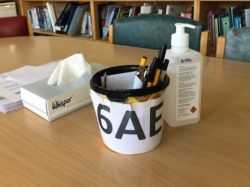Don’t forget code 6AE!
Nancy Kuchemann explores multi-disciplinary team (MDT) working, what it means in practice and how we are getting closer to a framework by which we can better determine, refine and coordinate the input that our patients need.
In our practice meeting room, where the practice team sits together daily to eat lunch, we have a plastic pot containing a pen and a pad of post-it notes. In marker pen on the tape around this is “6AE”.

This is the code we need to add to a patient’s notes to confirm that we have discussed their case at a multi-disciplinary team meeting. Someone has given us a list of names, we have targets to achieve and dashboards to tell us how close we are to them.
Now, we’ve discussed patient cases over lunch for years – it’s one of the things about my practice that new team members applaud and it helps maintain a happy and effective team. Whoever is in the building, whether GP or nurse, pharmacist or psychologist, senior partner or trainee, swaps their worries for solutions while they munch their sandwiches. But now we’re calling this ‘MDT working’ and in order not to forget to add the code that earns us money, we use the post-it to write ourselves a reminder before returning to our consulting rooms.
So, is this effective MDT working? Are we getting better outcomes as a result?
Maybe.
Many of the problems we bring to our conversations are insoluble, but we supporting each other to share the risk they pose to the patient and to our system.
We’re doing something deliberate. We’ve used tools to interrogate data to create a list of those who might benefit and are trying to include them in our discussions.
We’re trying to do something that adds value. As well as the code, we try write in the notes a couple of actions which might enhance a care plan.
We’re noticing who is not there, but could add to the conversation. As neighbourhood working develops, we are beginning to get to know our community nurses, mental health teams, voluntary sector reps and invite them for lunch too.
We’re sharing our tips, our tricks, our work-arounds. There is no doubt that we work in a fragmented system but are learning from each other how to better connect it.
The community nurses prefer us to complete a form and send it to an anonymous inbox, the palliative care team like a short text to their personal mobiles, the social prescribing link worker can pick up tasks from our notes system and we can compare our experience of the new apps at our disposal to obtain a specialist opinion.
Many of the problems we bring to our conversations are insoluble, but we supporting each other to share the risk they pose to the patient and to our system.
Knowing that I am operating within a system, however fragile or virtual, means that I feel more certain of my role within in it.
It is far from perfect. Staff turnover dismantles the relationships we thought we’d formed. Incentive schemes change and the new requirements confuse and confound us. The shared notes system we are promised never arrives. An IT upgrade corrupts the new decision making software. It’s hard not to sigh when reminded about 6AE.
Yet we do inch forward. Bit by bit we are creating a framework by which we can better determine, refine and coordinate the input that our patients need.
What I have noticed in myself is that I do feel more freedom to care. Knowing that I am operating within a system, however fragile or virtual, means that I feel more certain of my role within in it. I feel more able to occupy it and this clarity creates the space to be more genuinely patient focused and more compassionate. So as I clutch my post-it note, I know that there is much more to it than just a code.
Nancy has been a GP for 20 years and lives and works in Southwark. As well as being hugely attached to her medium-sized practice and partnership, she is a governing body member and lead for mental health at NHS Southwark Clinical Commissioning Group, soon to become part of the South East London CCG.
The issues raised in this blog will be part of the discussion with Nancy at the Melting Pot Lunch in London on 13 March.
 Nancy Kuchemann6 March 2020
Nancy Kuchemann6 March 2020

Comments